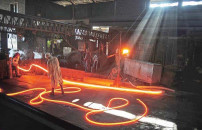View from McLeod Road: Why market’s bet on Engro Fertilizers is likely to fail
The stock price rise is based on some very faulty assumptions.

From a trough of Rs81.05 per share on January 16, the stock rallied to a peak of Rs151.95 on May 24. PHOTO: engrofertilizers.com
One of the biggest bets the market as a whole appears to be making in 2013 is that Engro is set for a comeback. The market is about to be proven wrong, and is likely to lose a lot of money doing so.
But first, a look at what has been happening to the company’s stock. Engro has always been one of the most respected companies in the country, and for good reason: it has a highly professional management, its major shareholders have a progressive attitude and its core business – Engro Fertilizers – was making a product that has a very high demand in Pakistan. What could possibly go wrong? A lot, apparently.
Engro’s business is based on some very shaky foundations: the promise of natural gas supply at absurdly low prices in a country that was rapidly ramping up domestic consumption and doing nothing to increase supply. It was a situation that could not last and it did not. For much of 2011 and 2012, Engro’s $1.1 billion manufacturing unit – the largest single-train urea factory in the world – was shut down owing to a lack of gas.
In 2013, there have been some rays of hope, with a little more gas supply, particularly to Engro’s older fertiliser plants, which have allowed the fertiliser business to more than triple its revenues in the first quarter to Rs9.7 billion, and swing to a quarterly profit of Rs646 million, from a loss of Rs1.4 billion in the corresponding period in the previous year.

This fact, combined with the election of Prime Minister Nawaz Sharif, has sent the market into a state of euphoria about Engro. From a trough of Rs81.05 per share on January 16, the stock rallied to a peak of Rs151.95 on May 24, soon after the election, a jump of over 87% in little over four months.
The problem, however, is that the market has been mistaking Sharif’s pledge to resolve the electricity crisis in Pakistan with an intention of somehow fixing all issues in Pakistan’s energy supply chain. The prime minister is indeed resolute in his desire to end power cuts in Pakistan. But doing so will require him to pick fights with a lot of very powerful vested interests. He has no intention of adding to that burden.
In order to resolve the electricity shortage in Pakistan, Sharif needs to get the state-owned power plants in Punjab up and running, and the only way the government will be able to afford to do that will be on coal or natural gas. Coal conversion will take time, so in the short run, they have to run on natural gas. The election has resolved at least one segment of the energy debate in Pakistan: the power sector is number one in terms of priorities for supply of natural gas.
The fertiliser manufacturers insist that there is still enough natural gas to supply them. In theory, they have a point, but in practise, the government would have to crack down on natural gas theft in upper Sindh and southern Punjab. Cutting theft will yield about 400 million cubic feet per day (mmcfd) of gas.
But, to put things in perspective, it took a highly motivated private sector management at the Karachi Electric Supply Company, operating in a much smaller geographic region, five years to cut electricity theft by one-third. How much gas theft reduction do we think a state-owned gas distribution company will be able to achieve in the next two years?
Some Engro investors argue that the government should supply gas only to Fatima Fertilizer and Engro Fertilizers’ new plant in Dharki, the only two in the country with still-valid sovereign guarantee of natural gas supply and cut it off for the rest. That, however, would involve cutting off the supply for the military-owned Fauji Fertilizer Company. The prime minister has plenty of fights already that he plans on picking with the military. Do investors seriously think he is going to waste his political capital fighting one of those fights over a fertiliser plant?
Which brings me to my final point about why the market is misinterpreting political conditions: the ruling Pakistan Muslim League Nawaz (PML-N) is an urban party. They have never focused on agriculture and their core constituency are not farmers. And lest anyone think that Engro can hold its investment in Thar coal hostage until the government gives it gas, think again: imported coal works just fine for the PML-N energy policy, and Thar coalfields are owned by the Sindh government, run by the rival Pakistan Peoples Party.
So ramping up local supplies of natural gas to Engro Fertilizers in the next two years is looking unlikely and the company’s plans to import liquefied natural gas are not making much progress so far. For the moment, the Engro Fertilizers comeback is looking very unlikely. In the long run, the company is likely to solve its natural gas shortage. But the time horizon on that is uncertain, and certainly does not justify a stock price increase this year.
Published in The Express Tribune, June 23rd, 2013.
Like Business on Facebook, follow @TribuneBiz on Twitter to stay informed and join in the conversation.



















COMMENTS
Comments are moderated and generally will be posted if they are on-topic and not abusive.
For more information, please see our Comments FAQ